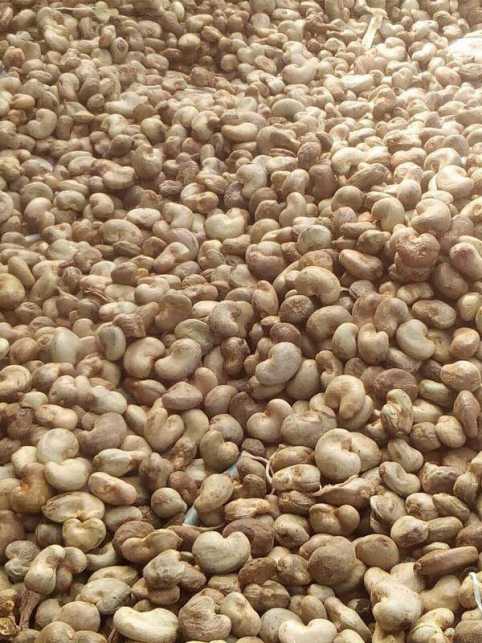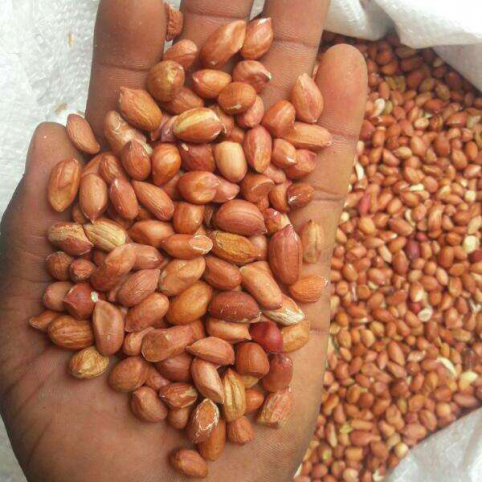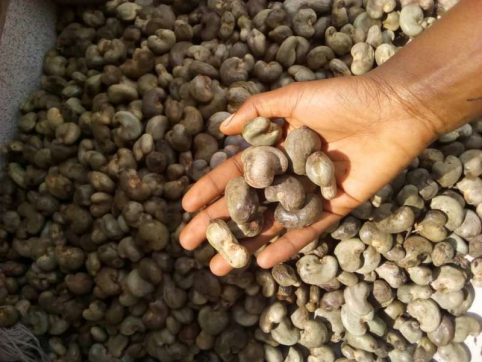Couldn't find the product you want?
Fill out this form to request the product.
Export from Nigeria
Nigeria's economy represents a middle income economy, mixed and emerging market, with expanding financial, service, communications, technology and entertainment sectors. It is ranked as the 21st largest economy in the world in terms of nominal GDP, and the 20th largest in terms of Purchasing Power Parity. It is the largest economy in Africa; its re-emergent manufacturing sector is the third-largest on the continent, and produces a large proportion of goods and services for the West African subregion. Nigeria recently changed its economic analysis to account for rapidly growing contributors to its GDP, such as telecommunications, banking, and its film industry.
The restoration of democracy and subsequent economic reforms have successfully put Nigeria back on track towards achieving its full economic potential.
Nigeria is the 12th largest producer of petroleum in the world and the 8th largest petroleum exporter, and has the 10th largest proven reserves. Petroleum plays a huge role in the Nigerian economy, accounting for 80% of Government earnings. However, the 100% mining capacity has still to be reached.
Nigeria also has a wide array of underexploited mineral resources which include natural gas, coal, bauxite, tantalite, gold and zinc. Despite huge deposits of these natural resources, the mining industry in Nigeria is only beginning to develop. Nigeria's manufacturing industry includes leather and textiles, plastics, processed food and auto manufacturing industry producing buses, cars, trucks and SUVs.
Cocoa and rubber are the leading non-oil export products of Nigeria and foreign exchange earners.
Exports of oil and natural gas is the main factor influencing Nigeria's growth and accounts for more than 91% of total exports.
Nigeria's main export partners are United States, India, Spain, Brazil, South Africa, United Kingdom, Netherlands, France, Germany, Japan.
Nigeria's main exports are:
- Crude Petroleum
- Petroleum Gas
- Refined Petroleum
- Rubber
- Cocoa Beans
- Milk
- Special Purpose Ships
- Coconuts, Brazil Nuts, and Cashews
- Crustaceans
- Other Oily Seeds
Import to Nigeria
Nigeria is considered a mixed economy with emerging market, and has already reached lower middle income status according to the World Bank, with its rich supply of natural resources, well-developed financial, communications, transport sectors and stock exchange, which is the second largest in Africa. Nigeria is a member of the MINT group of countries. It is also listed among the "Next Eleven" economies set to become among the biggest in the world. Nigeria is a founding member of the Commonwealth of Nations, the African Union, OPEC, and the United Nations amongst other international organizations.
Before the Nigerian civil war, Nigeria was self-sufficient in food. Agriculture used to be the principal foreign exchange earner of Nigeria, but after the war Nigeria relies mostly upon food imports to sustain itself. The agricultural sector is being transformed by commercialization at the small, medium and large-scale enterprise levels. Major crops include beans, cashew nuts, cocoa beans, though Nigeria mostly has to import foodstuffs to fill up the need.
In 2013, Nigeria introduced a policy regarding import duty on vehicles to encourage local manufacturing companies in the country. In this regard, some foreign vehicle manufacturing companies like Nissan have made known their plans to have manufacturing plants in Nigeria. Ogun is considered to be the current Nigeria's industrial hub, as most factories are located in Ogun and more companies are moving there, followed by Lagos.
Nigeria imports mainly industrial supplies, capital goods, food and beverage, fuel and lubricants, transport equipment and parts and consumer goods. 43% of total Nigerian imports come from Asia, 34% from Europe; 15% from America and 7% from Africa.
Nigeria's main import partners are China, United States, India, Netherlands, United Kingdom, Belgium, Luxembourg, Brazil, France, Germany, South Africa.
Nigeria's main imports are:
- Refined Petroleum
- Cars
- Rice
- Wheat
- Telephones
- Non-fillet Frozen Fish
- Delivery Trucks
- Raw Sugar
- Packaged Medicaments
- Motorcycles
Nuts section on Export Portal welcomes all sellers and buyers of these healthy snacks to connect to each other for successful trade. Sell nuts online on our site, expand your business worldwide. Buy nuts in bulk here, get the best deals online!
Nuts are a good source of nutrients, and depending on the preferences, they can be tossed over salads, used in different recipes, or served as snacks. Nuts not only taste great, but they’re loaded with protein, fiber, essential fats, antioxidants and minerals. It seems like every day more and more studies continue to be released extolling the health benefits of eating nuts as a fundamental part of a healthy diet.
Although most nuts contain similar nutrients, different types of nuts provide different health benefits. They also vary considerably in their fat content and amount of calories.
Brazil nuts, in addition to being loaded with healthy polyunsaturated fatty acids, they are the richest and most reliable food source of selenium.
Cashew nuts have a lower fat content and a higher protein and carbohydrate content than other types of nuts. Cashews contain more iron per gram than lean rump steak.
Walnuts have some special properties as well, with a high concentration of omega-3 fatty acids. Treat your taste buds to intensely-flavored black walnuts or sweet candied walnuts.
A handful of almonds to munch on between meals or toss them over a salad for a boost of protein, healthy fats, and antioxidants. Or try almond flour to make some scrumptious baked goodies.
Apricot kernels are very similar to almonds in shape and texture and have a rich nutty flavour.
Coconuts are considered both a fruit and a nut, and are a staple food in many parts of the world.
Chestnuts are the only low-fat nuts, with a fraction of the calories of other types of nuts. They contain just 1 gram of fat and a little less than 70 calories per 30 grams of dried or roasted nuts.
Hazelnuts are another rich source of vitamin E and monounsaturates. Also a very good source of the B vitamin biotin, which promotes healthy skin and hair.
Peanuts are high in protein, monounsaturated fat and the antioxidant resveratrol, which makes them excellent at protecting the heart and blood vessels.
Pecan nuts, like other types of nuts, owe much of their flavour to its high fat content, most of it in the form of heart-healthy monounsaturated oleic acid.
Macadamia nuts are very similar to Brazil nuts, but smaller and round. Macadamias are the fattiest although a large proportion of this is the healthy monounsaturated variety.
Pine nuts are higher in fat and calories than other types of nuts, but are a good source of blood pressure-regulating potassium, iron, copper and zinc and contain more protein than any other nut or seed.
Pistachios provide valuable amounts of minerals including calcium, iron, magnesium and zinc. They are the richest source of potassium of all nuts. Apart from that they are one of the most popular snacks.
Buy raw nuts, or sell cashews and walnuts in bulk on our site, find great deals and opportunities for export or import. Trade food products on Export Portal, get the best for your business!
Customs requirements of Nigeria
Nigeria Customs Contacts
Website: https://www.customs.gov.ng/index.php
E-Mail: info@customs.gov.ng
Address: Abidjan Street,Wuse, P.M.B. 26, Zone 3, Abuja - FCT, Nigeria
Telephone: 09 4621597
Fax: 09 5234694
Nigeria is a federal constitutional republic in West Africa, bordering Benin, Chad, Cameroon and Niger and having the Atlantic Ocean coastline. Nigeria includes 36 states and the Federal Capital Territory, where the capital, Abuja is located. Nigeria is officially a democratic secular country. Nigeria is often referred to as the "Giant of Africa", owing to its large population and economy. With approximately 174 million inhabitants, Nigeria is the most populous country in Africa and the seventh most populous country in the world.
Import procedures
Any person intending to import physical goods into Nigeria shall in the first instance process Form "M" through any Authorized dealer bank irrespective of the value and whether or not payment is involved.
The Form "M" shall have a validity period of six months for all imports except Plants and Machinery which shall have a validity period of one year. Requests for subsequent revalidation thereafter should be directed to the Director of Trade and Exchange Department at the Central Bank of Nigeria.
Supporting documents shall be clearly marked "Valid For Forex/Not Valid for Forex" as appropriate i.e. depending on whether or not foreign exchange remittance would be involved.
All applications for goods subject to Destination Inspection shall carry the " BA" code, while those exempted shall include "CB" in the prefix of the numbering system of the Form "M". Payments for goods exempted from Destination Inspection under the Scheme, would not be carried out in the Foreign Exchange Market, without a prior approval from the Central Bank of Nigeria. The list of goods exempted from Destination Inspection shall be as approved by the Honorable Minister of Finance and the approval shall be a pre-condition for the completion of Form M exempted from Destination Inspection.
The Form 'M' and the relevant pro-forma invoice (which shall have a validity period of three months) shall carry a proper description of the goods to be imported to facilitate price verification:
- Generic product name, i.e. product type, category
- Mark or brand name of the product where applicable
- Model name and or model or reference number, where applicable
- Description of the quality, grade, specification, capacity, size, performance etc.
- Quantity and packaging and/or packing
Form 'M' shall be valid for importation only after acceptance by the relevant Scanning /Risk Management Provider. Consequently, Authorized Dealers are to confirm acceptance of the Form M before proceeding with other import processes.
Documents in respect of each import transaction shall carry the name of the product, country of origin, specifications, date of manufacture, batch or lot number, Standards to which the goods have been produced (e.g. NIS, British Standards - PD. ISO, IES, DIN, etc).
All goods to be imported into the country shall be labeled in ENGLISH in addition to any other language of transaction; otherwise the goods shall be confiscated.
Where import items such as food, drinks, cosmetics, drugs, medical devices, chemicals, etc. are regulated for health or environmental reasons, they shall carry EXPIRY dates or the shelf life and specify the active ingredients, where applicable.
Electrical appliances (fluorescent lamps, electric bulbs, electric irons and ties, etc) shall carry information on life performance while cables shall carry information on the ratings.
All electronic equipment and instruments shall carry:
- Instruction Manual;
- Safety information and/or safety signs;
- A guarantee/warranty of at least six months.
All computer hardware, software, operating and embedded system shall continue to be Year 2000 compliance.
Any wrong or fraudulent misrepresentation of facts will result in delays and/or impoundment/seizures.
Importation of Blank products and/or without valid Form 'M' shall automatically qualify for seizure and destruction without warning, and subject to prosecution.
All imports into the country shall be accompanied by the following documents:
- Combined Certificate of Value and Origin (CCVO), and contain the following details in addition to those on the pro-forma invoice:
- Form "M"
- Adequate description of goods
- Port of destination (the actual port shall be specified e.g. Tin Can, Apapa, Kano, Onne, etc.)
- Shipment identification, date of shipment, Country of Origin, Country of supply
- Packing list
- Shipped/ Clean on Board Bill of Lading/Airway bill/Way bill/Road Way bill
- Manufacturer's Certificate of production which shall state standards and where it is not applicable, the Phytosanitary Certificate or Chemical Analysis Report should be made available.
- Laboratory test certificates for chemicals, foods, beverages, pharmaceuticals, electrical appliances and other regulated products, where applicable.
Export procedures
All goods (including oil/its derivatives and non-oil goods) exported from Nigeria shall be subject to inspection by Inspection Agent(s) appointed for that purpose by Government.
All exports exempt from inspection by the Inspection Agent(s) are listed in SCHEDULE "A" appended.
For the avoidance of doubt, goods prohibited for exportation from Nigeria as contained in the annual Fiscal Policy guidelines shall not be processed by the Inspection Agents. Goods on the current Export Prohibition list are detailed in SCHEDULE "B" appended.
The Inspection Agent(s) shall inspect the quality and quantity of all exports as well as the true value of goods to the consignee and shall issue a Clean Certificate of Inspection (CCI) in respect of such goods within 72 hours after the inspection of the goods. However, where a written complaint or protest has been lodged by the consignee or his agent on oil and gas exports, the relevant CCI shall be issued within a maximum period of 30 days.
In the event of uncovering discrepancies that cannot be corrected immediately, the exporter shall be issued with a "Non-Negotiable Certificate of Inspection" (NNCI). It is however in the interest and integrity of the exporter to correct the discrepancies to enable the Inspection Agent(s) issue the appropriate certificate and endorse the commercial (final) invoice accordingly.
Exporters shall open a domiciliary account with any bank in Nigeria and this same bank shall issue the Exporter with a Nigerian Export Proceeds Form (NXP Form) in six copies for completion in respect of each export transaction, The Exporter shall ensure that the export proceeds are credited to this account.
Having collected a set of NXP Form from his/her bank, the Exporter completes the Form in six copies, and returns same to the bank with a contract of sale or proforma invoice. The bank shall register and endorse same and retain the original copy. The remaining five copies shall be forwarded to the Inspection Agent(s).
The Exporter shall retain a photocopy of the NXP Form and use the NXP number as reference in all dealings with his bank, Central Bank of Nigeria, Inspection Agents and Nigeria Customs Service.
The NXP Form shall be utilized within six months from the date of registration, subject to renewal for 3 months by the dealing bank. Subsequent requests for renewal are to be approved by the Director, Trade and Exchange Department, Central Bank of Nigeria, Abuja otherwise it must be returned to the exporter's bankers for cancellation.
The exporter shall be required to pay to a designated bank, the Nigerian Export Supervision Scheme (NESS) Administrative charge of 0.5% and 0.15% of FOB value of the intended non-oil and oil/gas exports, respectively. The designated bank shall remit this to the NESS fee account in the Central Bank of Nigeria (CBN), If after inspection, the FOB value is found to be higher than that declared, then additional NESS fee shall be paid by the exporter accordingly.
Having completed the NXP Form, the exporter shall collect a REQUEST FOR INFORMATION (RFI) Form from the Inspection Agent or download from the Inspection Agent's website. The purpose of the RFI Form is to enable the inspection company to coordinate with the exporter, a suitable time and place for the physical inspection. It is therefore essential that exporters provide in the RFI, all the required information promptly.
The completed RFI shall be submitted to the Inspection Agent(s) along with all relevant documents relating to the export transaction.
For oil/gas exports, the exporter shall also collect a BILL OF LADING DECLARATION FORM from the Inspection Agent(s) or download from the Inspection Agent's website which shall be completed after loading and thereafter submitted to the Inspection Agent(s).
Upon receiving the relevant documents, the Inspection Agent(s) shall open a file accordingly.
Any person intending to export any goods from Nigeria shall give notice of not less than 10 working days to the Inspection Agents prior to shipment.
The inspection shall take place at the seaports, airports, terminals, or other points of dispatch or at the point of production and/or storage.
The exporter shall provide necessary logistics, such as ladder, fork lift trucks, labor, etc., to enable the Inspection Agent(s) perform their quality/quantity inspection and pricing analysis.
Where exports involve processed food, drugs, animals or plants, crude oil, liquefied natural gas, liquefied petroleum gas, condensate, Dual Purpose Kerosene (DPK), lubricants and grease, the necessary Government Agencies shall be invited for certification.
In the case of oil and gas exports, there shall be final joint inspection by the Inspection Agent(s), Nigeria Customs Service (NCS), the Department of Weights and Measures of the Federal Ministry of Commerce and Industry and Department of Petroleum Resources (DPR). Exporters should note that, units of measurement with respect to quality and quantity determination in the oil and gas industry are unique and should be appropriately reflected on the NXP Form.
Export prohibition list:
- Maize
- Timber (rough or sawn)
- Raw hides and skin (including Wet Blue and all unfinished leather)
- Scrap Metals
- Unprocessed rubber latex and rubber lumps
- Artifacts and Antiquities
- Wildlife animals classified as endangered species and their products
Sources:
http://www.shipperscouncil.com/export_guidelines.htm
https://www.delmas.com/static/eCommerce/Attachments/Nigeria.pdf
https://www.customs.gov.ng/ProhibitionList/import.php


